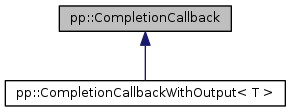
Public Member Functions
| CompletionCallback () | |
| CompletionCallback (PP_CompletionCallback_Func func, void *user_data) | |
| CompletionCallback (PP_CompletionCallback_Func func, void *user_data, int32_t flags) | |
| void | set_flags (int32_t flags) |
| void | Run (int32_t result) |
| void | RunAndClear (int32_t result) |
| bool | IsOptional () const |
| const PP_CompletionCallback & | pp_completion_callback () const |
| int32_t | flags () const |
| int32_t | MayForce (int32_t result) const |
Protected Attributes
| PP_CompletionCallback | cc_ |
Detailed Description
This API enables you to implement and receive callbacks when Pepper operations complete asynchronously.
You can create these objects yourself, but it is most common to use the CompletionCallbackFactory to allow the callbacks to call class member functions.
Constructor & Destructor Documentation
| pp::CompletionCallback::CompletionCallback | ( | ) | [inline] |
The default constructor will create a blocking CompletionCallback that can be passed to a method to indicate that the calling thread should be blocked until the asynchronous operation corresponding to the method completes.
Note: Blocking completion callbacks are only allowed from from background threads.
| pp::CompletionCallback::CompletionCallback | ( | PP_CompletionCallback_Func | func, |
| void * | user_data | ||
| ) | [inline] |
A constructor for creating a CompletionCallback.
- Parameters:
[in] func The function to be called on completion. [in] user_data The user data to be passed to the callback function. This is optional and is typically used to help track state in case of multiple pending callbacks.
| pp::CompletionCallback::CompletionCallback | ( | PP_CompletionCallback_Func | func, |
| void * | user_data, | ||
| int32_t | flags | ||
| ) | [inline] |
A constructor for creating a CompletionCallback with specified flags.
- Parameters:
[in] func The function to be called on completion. [in] user_data The user data to be passed to the callback function. This is optional and is typically used to help track state in case of multiple pending callbacks. [in] flags Bit field combination of PP_CompletionCallback_Flagflags used to control how non-NULL callbacks are scheduled by asynchronous methods.
Member Function Documentation
| int32_t pp::CompletionCallback::flags | ( | ) | const [inline] |
The flags() function returns flags used to control how non-NULL callbacks are scheduled by asynchronous methods.
- Returns:
- An int32_t containing a bit field combination of
PP_CompletionCallback_Flagflags.
| bool pp::CompletionCallback::IsOptional | ( | ) | const [inline] |
IsOptional() is used to determine the setting of the PP_COMPLETIONCALLBACK_FLAG_OPTIONAL flag.
This flag allows any method taking such callback to complete synchronously and not call the callback if the operation would not block. This is useful when performance is an issue, and the operation bandwidth should not be limited to the processing speed of the message loop.
On synchronous method completion, the completion result will be returned by the method itself. Otherwise, the method will return PP_OK_COMPLETIONPENDING, and the callback will be invoked asynchronously on the same thread where the PPB method was invoked.
- Returns:
- true if this callback is optional, otherwise false.
| int32_t pp::CompletionCallback::MayForce | ( | int32_t | result | ) | const [inline] |
MayForce() is used when implementing functions taking callbacks.
If the callback is required and result indicates that it has not been scheduled, it will be forced on the main thread.
Example:
int32_t OpenURL(pp::URLLoader* loader, pp::URLRequestInfo* url_request_info, const CompletionCallback& cc) { if (loader == NULL || url_request_info == NULL) return cc.MayForce(PP_ERROR_BADRESOURCE); return loader->Open(*loader, *url_request_info, cc); }
- Parameters:
[in] result PP_OK_COMPLETIONPENDING or the result of the completed operation to be passed to the callback function. PP_OK_COMPLETIONPENDING indicates that the callback has already been scheduled. Other non-positive values correspond to error codes from pp_errors.h. Positive values indicate additional information such as bytes read.
- Returns:
PP_OK_COMPLETIONPENDINGif the callback has been forced, result parameter otherwise.
| const PP_CompletionCallback& pp::CompletionCallback::pp_completion_callback | ( | ) | const [inline] |
The pp_completion_callback() function returns the underlying PP_CompletionCallback
- Returns:
- A
PP_CompletionCallback.
| void pp::CompletionCallback::Run | ( | int32_t | result | ) | [inline] |
Run() is used to run the CompletionCallback.
Normally, the system runs a CompletionCallback after an asynchronous operation completes, but programs may wish to run the CompletionCallback manually in order to reuse the same code paths.
- Parameters:
[in] result The result of the operation to be passed to the callback function. Non-positive values correspond to the error codes from pp_errors.h(excludingPP_OK_COMPLETIONPENDING). Positive values indicate additional information such as bytes read.
| void pp::CompletionCallback::RunAndClear | ( | int32_t | result | ) | [inline] |
RunAndClear() is used to run the CompletionCallback and clear out the callback so that it cannot be run a second time.
- Parameters:
[in] result The result of the operation to be passed to the callback function. Non-positive values correspond to the error codes from pp_errors.h(excludingPP_OK_COMPLETIONPENDING). Positive values indicate additional information such as bytes read.
| void pp::CompletionCallback::set_flags | ( | int32_t | flags | ) | [inline] |
The set_flags() function is used to set the flags used to control how non-NULL callbacks are scheduled by asynchronous methods.
- Parameters:
[in] flags Bit field combination of PP_CompletionCallback_Flagflags used to control how non-NULL callbacks are scheduled by asynchronous methods.
Member Data Documentation
PP_CompletionCallback pp::CompletionCallback::cc_ [protected] |
The documentation for this class was generated from the following file: